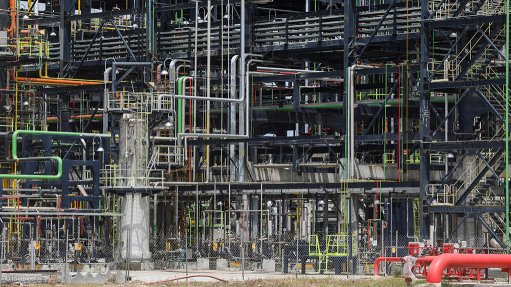SMEs need to take up 4IR tech to align with larger players
Smart manufacturing is important to small and medium-sized enterprises (SMEs) because such businesses account for between 95% and 99% of every major country’s manufacturing sectors, Manufacturing Enterprise Solutions Association vice-chairperson Dr Ananth Seshan said during the organisation’s year-end function on November 17.
As such, he said, it was vital for SMEs to implement technologies and processes of the Fourth Industrial Revolution (4IR), but highlighted several reasons why this was a challenge for SMEs.
“It is very fair to say . . . that if SMEs are not going to be participating in the smart manufacturing journey, or in the [4IR, then] what is the big deal of 1% or 2% of the entire manufacturing population participating in [4IR],” Seshan stated.
He noted that although manufacturers have been talking about 4IR for the past seven years, to date, few SMEs have entered the fray.
Having noted this disconnect between large manufacturers and SMEs, Seshan said that going forward, attention needed to be focussed on SMEs and their part in the 4IR for the sake of reviving the global economy, regardless of the Covid-19 pandemic.
“The pandemic has made it even more important. But even before the pandemic, it was important for SMEs to participate [in the 4IR].”
However, most SMEs are not using 4IR technologies because, Seshan said, “as usual” the larger players are the leaders in any revolution, and in the case of the 4IR, investments in excess of $5-trillion have been mainly made into machine upgrades, infrastructure, robots and automation equipment by large manufacturers.
As a result, he said, the productivity of labour forces improved, which means “labour has been retrenched and therefore the number of parts per labour has increased”.
“It is not because labour’s productivity has improved. The productivity of labour has improved because of the retrenchment of labour,” Seshan added. This has introduced structural unemployment in the short term.
Nonetheless, he said the investment in capital by the large players has also introduced a productivity gap between the large players and the small players, resulting in SMEs becoming less competitive as they have been “left wanting” in terms of productivity.
PROACTIVE SME PATH
However, Seshan said SMEs could leverage four gaps in unrealised capacity – ecosystem drag-along, leapfrogging, workforce empowerment and collaboration – what he describes as “handholding”.
Ecosystem drag-along is aimed at building capability in two ways – to create a platform for SMEs to do commerce globally and to create the capability to provide adequate technology to participate in the global supply chain.
Ecosystem drag-along is the concept of larger companies trying to “hand-hold” the smaller suppliers to upgrade technology, to become better and to adopt 4IR technologies by investing in platforms and workforce empowerment of suppliers to bring in new technology in SMEs, he said.
Leapfrogging involves implementing new technology off an analogue kind of foundation, thereby propelling companies using old technology into the 4IR with up-to-date and modern technology.
This includes going from processes using paper records to those using digital records; from silo-based manufacturing to a connected digital thread; delayed visibility to instantaneous visibility; uncertainty in decision-making to informed decision-making; and a reactive response to proactive response.
These were the various ways in which SMEs could leapfrog without making major investments, especially for labour intensive companies, said Seshan.
In terms of workforce empowerment, he pointed out there were three sides to this.
Firstly, Seshan said jobs were going to be lost. “The repetitive, manual tasks are being replaced by robots and automated systems. That is going to happen for sure. But then there are two other types of activities, the biggest chunk [being] cooperative activities where humans and machines are going to be collaborating and cooperating in manufacturing.”
He said that, as humans are replaced by robots and automation, it was critical to empower human workforces with digital attachments and wearables and ensure they found new machinery-relevant roles, such as programming and maintenance.
“All of these new automation and robotics seen in the market need to be managed, controlled, reprogrammed. You need special skills . . . creating new jobs,” said Seshan.
Comments
Press Office
Announcements
What's On
Subscribe to improve your user experience...
Option 1 (equivalent of R125 a month):
Receive a weekly copy of Creamer Media's Engineering News & Mining Weekly magazine
(print copy for those in South Africa and e-magazine for those outside of South Africa)
Receive daily email newsletters
Access to full search results
Access archive of magazine back copies
Access to Projects in Progress
Access to ONE Research Report of your choice in PDF format
Option 2 (equivalent of R375 a month):
All benefits from Option 1
PLUS
Access to Creamer Media's Research Channel Africa for ALL Research Reports, in PDF format, on various industrial and mining sectors
including Electricity; Water; Energy Transition; Hydrogen; Roads, Rail and Ports; Coal; Gold; Platinum; Battery Metals; etc.
Already a subscriber?
Forgotten your password?
Receive weekly copy of Creamer Media's Engineering News & Mining Weekly magazine (print copy for those in South Africa and e-magazine for those outside of South Africa)
➕
Recieve daily email newsletters
➕
Access to full search results
➕
Access archive of magazine back copies
➕
Access to Projects in Progress
➕
Access to ONE Research Report of your choice in PDF format
RESEARCH CHANNEL AFRICA
R4500 (equivalent of R375 a month)
SUBSCRIBEAll benefits from Option 1
➕
Access to Creamer Media's Research Channel Africa for ALL Research Reports on various industrial and mining sectors, in PDF format, including on:
Electricity
➕
Water
➕
Energy Transition
➕
Hydrogen
➕
Roads, Rail and Ports
➕
Coal
➕
Gold
➕
Platinum
➕
Battery Metals
➕
etc.
Receive all benefits from Option 1 or Option 2 delivered to numerous people at your company
➕
Multiple User names and Passwords for simultaneous log-ins
➕
Intranet integration access to all in your organisation


















